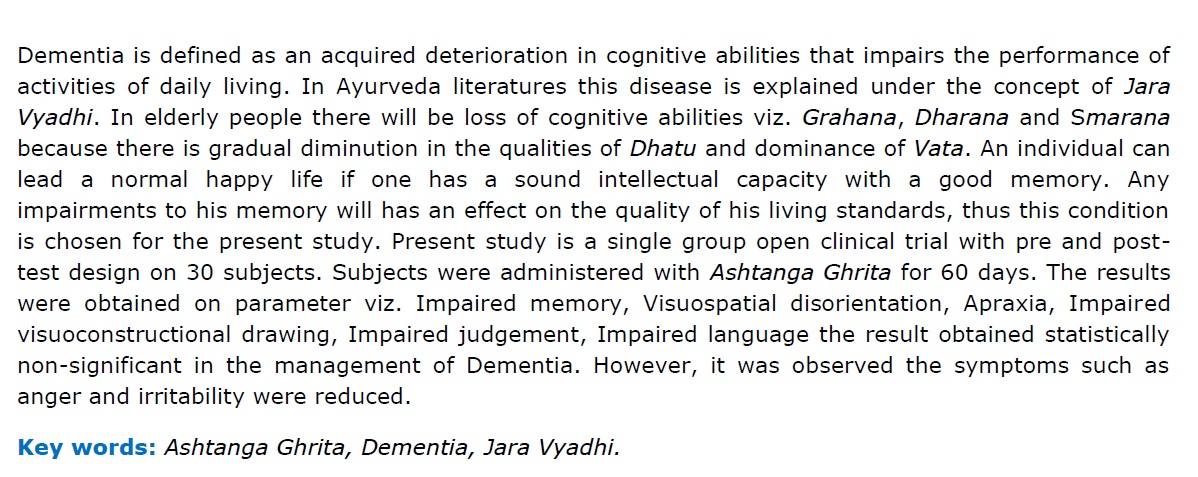A clinical study to evaluate the efficacy of Ashtanga Ghrita in Dementia
DOI:
https://doi.org/10.21760/jaims.v6i5.1466Keywords:
Ashtanga Ghrita, Dementia, Jara Vyadhi.Abstract
Dementia is defined as an acquired deterioration in cognitive abilities that impairs the performance of activities of daily living. In Ayurveda literatures this disease is explained under the concept of Jara Vyadhi. In elderly people there will be loss of cognitive abilities viz. Grahana, Dharana and Smarana because there is gradual diminution in the qualities of Dhatu and dominance of Vata. An individual can lead a normal happy life if one has a sound intellectual capacity with a good memory. Any impairments to his memory will has an effect on the quality of his living standards, thus this condition is chosen for the present study. Present study is a single group open clinical trial with pre and post-test design on 30 subjects. Subjects were administered with Ashtanga Ghrita for 60 days. The results were obtained on parameter viz. Impaired memory, Visuospatial disorientation, Apraxia, Impaired visuoconstructional drawing, Impaired judgement, Impaired language the result obtained statistically non-significant in the management of Dementia. However, it was observed the symptoms such as anger and irritability were reduced.
Downloads
References
YP Munjal, AK Agarwal et al, API Textbook of Medicine 10th ed vol 2, part 2, pp 2225
YP Munjal, AK Agarwal et al, API Textbook of Medicine 11th ed vol 2, part 2, pp 2139
The Rowland Universal Dementia Assessment Scale: A Multicultural Cognitive Assessment Scale. (Storey, Rowland, Basic, Conforti & Dickson, 2004). International Psychogeriatrics, 16 (1), 13-31
Agnivesha, Charaka Samhita edited by, Yadavji Trikamji Acharya with Ayurvedadipika Commentary by Chakrapanidatta, Varanasi: Chaukhamba Surabharathi Prakashan. Shareerasthana 1/18
K R Srikanta Murthy, Ashtanga Hridayam vol 2 Chowkhamba krishnadas academy,Varanasi uttaratantra 39/1
Zhi –Jing Chen, Yan-Fang Yang et al., Dietary total prenylflavonoids from the fruits of Psoralea corylifolia L. Prevents age-related cognitive deficits and down regulates Alzheimer’s markers in SAMP8 mice
Priya Kashyap, Heera Ram et al., Scopoletin : antimyloidogenic, Amticholinesterase, and neuroprotective potential of a natural compound present in Argyreia speciose roots by in vitro and in silico study
Lakshmi Pravallika Pojka, Krishnan Mohan G et al., Neuroprotective activity of asparagus racemose against ethanol induced cognitive impairment and oxidative stress in rats brain: auspicious for controlling the risk of Alzheimer’s disease.
Aimi syamina abdul manap, shantini vijayabalan et al., Bacopa Monnieri, aneuroprotective lead in Alzheimer’s disease.
Arunachalam muthuraman, nirmal singh: Attenuating effect of acorus calamus extract: an evidence of anti-oxidative, anti-inflammatory, neuroprotective and calcium inhibitory effects
Bhuvan Chandra Joshi, Sumitra Uniyal, Pharmacognostical Review of Tinospora cordifolia.
Sumeet Goel, Nisha Kumara Ojha, Ashtanga Ghrita: A noble Ayurveda drug for central nervous system, journal of Ayurveda and holistic medicine.















